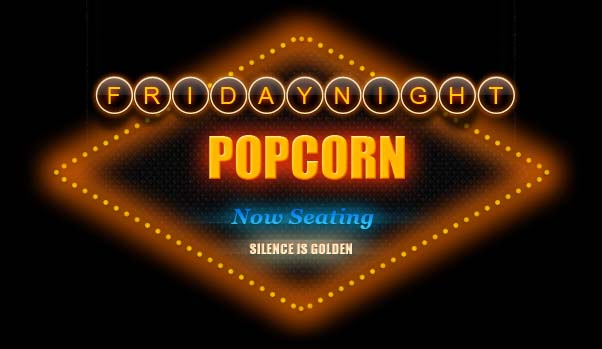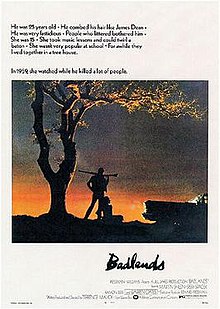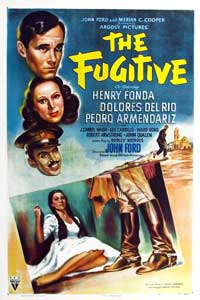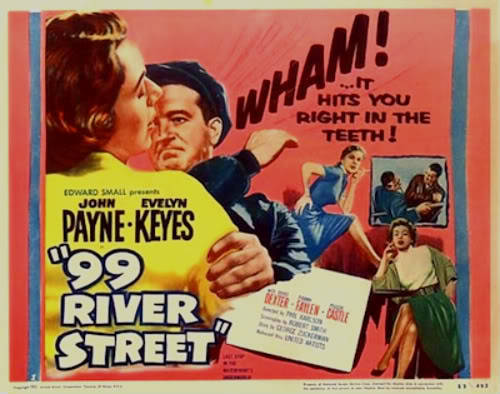Sunday, April 14, 2013
The Language of Films
I've always thought films spoke different languages. A summary of the plot is the traditional way to describe a film, but sometimes the plot isn't the main focus of the director. If I were to tell you that I watched a film about gangs in New York city last night, then I could have been referring to Goodfellas - but I might also have been referring to West Side Story. Clearly the language of these films separates them far more than a casual plot. Terrence Malick has developed his own language for his films. Audiences judging his works based on plot, will probably be disappointed. I imagine To The Wonder will divide audience again. Some directors or films strive to make you "think". Life of Pi seemed to be asking it's audience to analyze "faith" - in much the same way that A.I. asked it's audience to analyze "love". So, the next time you dive into another mindless summer popcorn sequel - remember being a film fan doesn't have to always be a passive experience.
Sunday, April 7, 2013
Good things come in threes
 Where do you draw the line between inspiration and plagiarism in film? Courts have examined, critics have disputed, fans have debated - yet the practice still lives on, mainly because the potential for big money is so tempting. There are countless examples of two studios green-lighting similar properties at the same time, hoping to beat the other. Tombstone vs. Wyatt Earp. 1492: Conquest of Paradise vs Christopher Columbus: The Discovery. Or perhaps one of the most interesting of these scenarios is when very similar plots all materialized in Like Father Like Son (1987), 18 Again! (1988), Vice Versa (1988), and Big (1988).
Where do you draw the line between inspiration and plagiarism in film? Courts have examined, critics have disputed, fans have debated - yet the practice still lives on, mainly because the potential for big money is so tempting. There are countless examples of two studios green-lighting similar properties at the same time, hoping to beat the other. Tombstone vs. Wyatt Earp. 1492: Conquest of Paradise vs Christopher Columbus: The Discovery. Or perhaps one of the most interesting of these scenarios is when very similar plots all materialized in Like Father Like Son (1987), 18 Again! (1988), Vice Versa (1988), and Big (1988).Many times there is a clear hit, or winner. Or one is viewed as basically a knock-off, cheap, quick money-grab imitation. (Mac & Me I'm looking at you.) But remarkably, two of today's most acclaimed/successful directors both started down their career paths in similar fashions. When Arthur Penn's Bonnie & Clyde hit the theaters in 1967, it changed the way violence and film could coexist. It also must have inspired two young directors, Steven Spielberg and Terrence Malick. A few years later Badlands and The Sugarland Express both explored similar ideas with similar characters. Malick and Spielberg's careers have differed greatly since that time, but have always found it interesting that they were drawn to similar stories at that time. It probably isn't fair to compare or judge one against the other, but you can clearly see the early talents of two exceptional directors. I'm not sure that we will ever see this much talent tackle such similar ideas within such a close time frame again - but if you are looking to burn six or seven hours, this will make a tremendous triple feature.
Sunday, February 10, 2013
Too Smart For Its Own Good
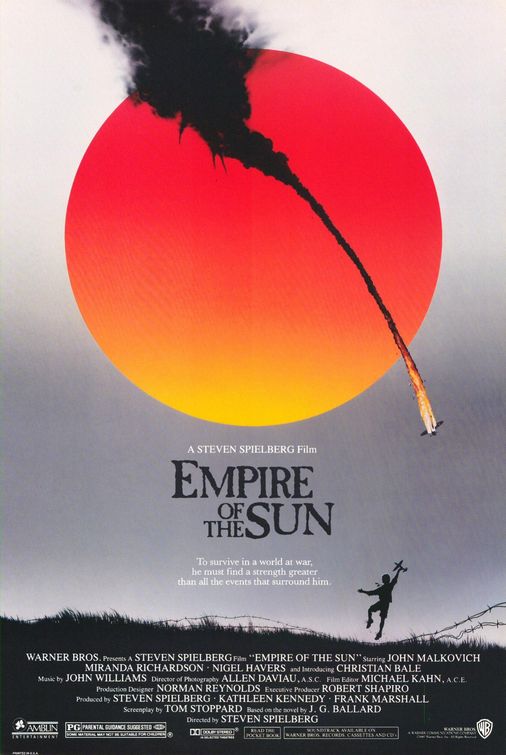
I enjoy revisiting films fter a certain amount of time has elapsed. HD has given me many excuses to re-look at a film that I may have watched as a teenager or younger film enthusiast. Sometimes my only contact with a film was via a small 4x3 television - and perhaps even an "edited for network presentation" version at that. So, when Empire of The Sun recently was given the HD treatment, I felt that this was the right time to take a peek at a film that I never saw in a theater, and my prior exposure was probably less than ideal. Overall I enjoyed the film, felt it lacked in certain places - but came away thinking that it probably deserves to be remembered as one of Spielberg's "lesser" films. That is until I stumbled upon this review. (Essentially the reviewer reveals that much of the film is not necessarily "real", but false memories and imaginations from the POV of the main character - not a single shot can be trusted.) I don't remember ever having such a revelation after watching a movie. I felt as though I immediately needed to watch it again, with the veil lifted from my eyes. Truly, this film has depth and stories that I was unaware of - but I don't feel alone, for I don't think many others caught on to the subtleties as well. But this led me to wonder: if a film is too smart for its audience is it still "good"? I suppose the definition of good can be debated, but essentially it seems that the point of this film may have been too ambitious for most viewers to catch on to. And if the audience doesn't "get" it, then perhaps it failed in communicating it's story or goals.
I truly wonder what direction Spielberg's career would have gone had this film been critically and financially successful. It reminds me of the story behind John Ford's The Fugitive. Apparently when this Ford film essentially flopped he decided to abandon a career path of art-films, and focus on western crowd pleasers instead.
Certainly critical and commercial success help dictate the path that a film director must take, but it does make me wonder things like: what if Altman's Popeye had been a hit, or if Cameron's Terminator had flopped. We'll never know, but I'm guessing the films that followed would probably have been different.
Saturday, January 26, 2013
Odd Man Out
Although The Third Man may be his most famous work, Carol Reed's Odd Man Out might be his greatest. For some reason this film has fallen tragically out of print and is almost impossible to find on DVD. This is truly a great movie - and deserves to be seen.
Monday, January 21, 2013
A Discovery
I watch old movies. I realize that this isn't for everyone. But part of the fun is stumbling upon a film that no one else talks about - or has fallen between the cracks of film history. Film Noir seems to be rich with this type of scenario. Films that were churned out and perhaps now forgotten. Turner Classic recently invited Film Noir expert Eddie Muller to program an evening of noir and he presented a real doozy. 99 River Street just blew me away. It's got a lot of the usual noir cliches, but when it ended I felt like I was now in some sort of private club that now carried a 99 River Street card.
If these venetian blinds, dark alleys, and femme fatale suit your fancy then I recommend working your way through this list - some real knockouts!
If these venetian blinds, dark alleys, and femme fatale suit your fancy then I recommend working your way through this list - some real knockouts!
Tuesday, January 15, 2013
Music To Live By
I love movies because of the way they tell stories that relate to our lives and to human experience; music is a major component of film; hence listening to the music divorced from the film is a way to channel those storytelling experiences on a more abstract level, and also appreciate the music in its own right. There are feelings I define in my life because they emotionally sound like Star Trek, or Logan's Run, or Take A Hard Ride, and they are deeply primal. They are the simplest expressions of themselves and like a great poem the act of explaining them is so much longer and clumsier than the thing itself."
(FSM Vol. 9, No. 7 p.44)
I remember the first time I ever really noticed music in a movie and immediately asked my parents for the music from this film: Star Wars. Unfortunately, my parents, in their honest efforts bought me the Meco disco record instead. You can't begin to count the times I tried to figure out where this song actually played in the movie. You could just color me confused.
But several years later my grade school decided to read Thornton Wilder's play Our Town in class. And then watch the 1940 movie as well. I'm sure my teacher had no idea that the thing that would stick with me would be the haunting Aaron Copland music - but to this day it remains some of my favorite music ever written for film.
I have continued this passion for many years, always amazed at the effect music can have.
Here's a few scores that have probably not received enough attention for one reason or another...


But several years later my grade school decided to read Thornton Wilder's play Our Town in class. And then watch the 1940 movie as well. I'm sure my teacher had no idea that the thing that would stick with me would be the haunting Aaron Copland music - but to this day it remains some of my favorite music ever written for film.
I have continued this passion for many years, always amazed at the effect music can have.
Here's a few scores that have probably not received enough attention for one reason or another...


Sunday, January 13, 2013
Vindicated By Time
Time has a funny way of changing things. We generally accept that over time our cars will break down, our waists will expand and our tastes will change. We are comfortable with this basic life-cycle and the way history records it. But "time" also has a way of allowing us to rediscover works that may have just been born at the wrong time.
Rarely do works that are initially panned and commercially ignored get the chance to be rediscovered. When something fails, we generally move on and historians tend to mark this accordingly. Yet, every now and then something emerges from the past, gets reanalyzed, finds new fans, and a "new" classic is born.
Moby-Dick got trashed by critics when it was first published in 1851. The negative press caused Herman Melville, who had been a somewhat popular author in the 1840s, to fall into depression and obscurity. It wasn't until the '20s and the '30s — over three decades after Melville's death — when scholars rediscovered Moby-Dick and reevaluated it as one of the classics of American literature.1
The Impressionists (Claude Monet, Pierre-August Renoir, Edouard Manet, etc.) were ridiculed at first (at their first joint exposition, the public came en masse to mock their work....
Even in recent history, Weezer's second album, Pinkerton, was initially trashed by both critics and fans and sold dismally. Rolling Stone readers named it the second worst album of 1996, and Rivers Cuomo viewed it as an Old Shame for years. Today, it's regarded as one of the greatest albums of The Nineties, and as one of the albums responsible for bringing emo to the mainstream.
In film there are several noted and famous movies that needed time to find an audience and critical praise. The Night Of The Hunter was neither a critical, nor a commercial success, when it came out. Today, it's considered a masterpiece. Other films such as Citizen Kane, Vertigo, It's A Wonderful Life, Pinocchio, The Shawshank Redemption all also to one degree or another needed time to be fully appreciated.
But when we talk about flops in movie history few movies can provide the resume that Heaven's Gate provides. This is a film that flopped to such drastic proportions that it destroyed a genre, a studio and a director all at one time. It has become synonymous with movie flops over time - so much so that when Waterworld was sinking, it was called "Kevin's Gate" around Hollywood circles. This film seemingly is the poster child for director's indulgence and bloated spending.
I'll admit that this movie was of no interest to me until I began to read of Criterion's recent treatment. Essentially Criterion teamed with director, Cimino to revisit and remaster the director's original vision for this film. It's pretty well documented that after a very brief release the studio eliminated nearly 70 minutes and re-released hoping to appease early audience feedback. This was all in vain, and the failure of westerns, United Artists and Michael Cimino all seemed cemented in time. But I must admit - this is a truly remarkable film. Heaven's Gate is quite nearly a masterpiece. There are a few small imperfections, but the scope and detail of this film are incredibly immersive. I'm not sure why critics and audiences had such vile for this film initially. And I suppose the studio-altered shorter version only confused and bewildered audiences. But I have seen very few films that attempt something so grand and spectacular as this. It's odd to me that many of the things Cimino was ridiculed for on this film are generally lauded today as commonplace (his attention to detail, insistence on realism, casting of character actors, etc...) I don't know if this will ever be viewed as a classic, but I believe that it is a far superior film than what legend has handed down. Perhaps one day Cimino will be vindicated by time.
Rarely do works that are initially panned and commercially ignored get the chance to be rediscovered. When something fails, we generally move on and historians tend to mark this accordingly. Yet, every now and then something emerges from the past, gets reanalyzed, finds new fans, and a "new" classic is born.
Moby-Dick got trashed by critics when it was first published in 1851. The negative press caused Herman Melville, who had been a somewhat popular author in the 1840s, to fall into depression and obscurity. It wasn't until the '20s and the '30s — over three decades after Melville's death — when scholars rediscovered Moby-Dick and reevaluated it as one of the classics of American literature.1
The Impressionists (Claude Monet, Pierre-August Renoir, Edouard Manet, etc.) were ridiculed at first (at their first joint exposition, the public came en masse to mock their work....
Even in recent history, Weezer's second album, Pinkerton, was initially trashed by both critics and fans and sold dismally. Rolling Stone readers named it the second worst album of 1996, and Rivers Cuomo viewed it as an Old Shame for years. Today, it's regarded as one of the greatest albums of The Nineties, and as one of the albums responsible for bringing emo to the mainstream.
In film there are several noted and famous movies that needed time to find an audience and critical praise. The Night Of The Hunter was neither a critical, nor a commercial success, when it came out. Today, it's considered a masterpiece. Other films such as Citizen Kane, Vertigo, It's A Wonderful Life, Pinocchio, The Shawshank Redemption all also to one degree or another needed time to be fully appreciated.
But when we talk about flops in movie history few movies can provide the resume that Heaven's Gate provides. This is a film that flopped to such drastic proportions that it destroyed a genre, a studio and a director all at one time. It has become synonymous with movie flops over time - so much so that when Waterworld was sinking, it was called "Kevin's Gate" around Hollywood circles. This film seemingly is the poster child for director's indulgence and bloated spending.
I'll admit that this movie was of no interest to me until I began to read of Criterion's recent treatment. Essentially Criterion teamed with director, Cimino to revisit and remaster the director's original vision for this film. It's pretty well documented that after a very brief release the studio eliminated nearly 70 minutes and re-released hoping to appease early audience feedback. This was all in vain, and the failure of westerns, United Artists and Michael Cimino all seemed cemented in time. But I must admit - this is a truly remarkable film. Heaven's Gate is quite nearly a masterpiece. There are a few small imperfections, but the scope and detail of this film are incredibly immersive. I'm not sure why critics and audiences had such vile for this film initially. And I suppose the studio-altered shorter version only confused and bewildered audiences. But I have seen very few films that attempt something so grand and spectacular as this. It's odd to me that many of the things Cimino was ridiculed for on this film are generally lauded today as commonplace (his attention to detail, insistence on realism, casting of character actors, etc...) I don't know if this will ever be viewed as a classic, but I believe that it is a far superior film than what legend has handed down. Perhaps one day Cimino will be vindicated by time.
Friday, January 11, 2013
Revisiting the Coen Bothers
A few nights ago I caught a movie that I had been meaning to see for some time. Blood Simple. Made on a shoe-string budget and winner of the Grand Jury's Prize at the Sundance Film Festival in 1985 this film garnered applause from critics and audiences alike. In many ways this movie ushered in the independent film genre into the mainstream conscious. Personally, I think the brother tandem of Joel & Ethan Coen may be one of the coolest voices in American cinema. I won't say that I love every one of their films, but I can say I admire each one. Each of their films contain clever dialogue and provides subtle nods towards some of their acknowledged influences. With that in mind I thought I might list a few of their movies and the artists/authors/films that may have provided inspiration.
Blood Simple
 Author - James M Cain
Author - James M Cain
Novel - The Postman Always Rings Twice
Film - Detour
I think this film now shows its age a bit, but it is still a fun (yet bloody) look at film noir. This film helped launch the careers of not only the Coens, but their DP Barry Sonnenfeld, actress Frances McDormand, and an uncredited Holly Hunter.
Another interesting note, McDormand and Joel Coen enjoyed the experience so much they decided to get married.
Raising Arizona
 Animator - Chuck Jones
Animator - Chuck Jones
Film - Mad Max
Novella - Of Mice And Men
Very different than their first film, this comedy pays homage to some classic zany cartoons and splashes in characters (and names) that have traces from John Steinbeck's story. Made for approx $6 million and grossing around $22 million - this became the Coen's first big hit.
Miller's Crossing
Author - Dashiell Hammett
Film - The Glass Key
The Coens have called this their "Glass Key" remake, and it is very similar. It is interesting that they would want to remake a movie that was hardly a hit - and that very few people (outside of film historians) had ever heard of. This film started the fruitful relationship of the Coens with John Turturro.
Barton Fink
William Faulkner
Biblical Parables
Apparently this film was conceived while the Coens were suffering writer's block as they worked on Miller's Crossing. The character of W.P. Mayhew is based on William Faulkner, whose first Hollywood contract was to write a wrestling movie. This film was the first film to win all three major awards (Palme D'or, Best Director, and Best Actor) at the Cannes Film Festival. Also, it was unanimously chosen for the Palme D'or.
The Hudsucker Proxy
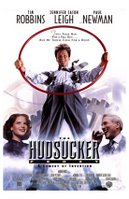 Directors - Frank Capra & Preston Sturges
Directors - Frank Capra & Preston Sturges
Films - The Lady Eve & Executive Suite
This is, in my mind, one of the Coen's best films that just got lost in the shuffle. It pretty much flopped at the box office, but it was a clever, well-written nod to the famous screwball comedies of the 30's and 40's. This film is definitely worth a look on DVD.
Fargo
 Film/Novel - In Cold Blood , Psycho & The Shining
Film/Novel - In Cold Blood , Psycho & The Shining
This is one of the most critically acclaimed film of the Coen's library, winning several Academy awards. Interestingly, Roderick Jaynes (pseudonym of filmmakers the Coens) was nominated for an Academy award - one of the few fictitious characters to receive a nomination.
The influences of Truman Capote's novel can certainly be felt throughout this violent classic.
The Big Lebowski
 Author - Raymond Chandler
Author - Raymond Chandler
Novel/Film - The Big Sleep
Film - The Long Goodbye
Choreographer - Busby Berkeley
Hands down my favorite Coen movie. Some of the funniest writing in a film you'll ever hear. Hugely influenced by the Chandler novel - The Big Sleep with a few Berkeley dance numbers thrown in for good measure.
This is one of those movies that gets funnier each time you see it.
O Brother, Where Art Thou
 Film - Sullivan's Travels
Film - Sullivan's Travels
Musicians - Robert Johnson & Tommy Johnson
Politician - W. Lee (Pappy) O'Daniel
Film - The Wizard Of Oz
Another nod to Preston Sturges. In Sturges film, Sullivan's Travels, the main character wants to make a great film and call it O Brother, Where Art Thou. Of course there is the very obvious influences of the Odyssey - which the Coens claim they never read. There has also been some debate as to which Johnson, the character in the movie is based on, but there is no doubting the influences of the real-life Pappy O'Daniel. Great stuff.
This doesn't cover all of their movies, but it certainly shows that the Coens have a great respect for film history. If this piques your interest at all I recommend checking out the book The Coen Brothers: The Life of the Mind.
Nice to see the Academy award these guys with an Oscar - I believe they have been providing some of the most original work in film for the last decade.
Blood Simple
 Author - James M Cain
Author - James M CainNovel - The Postman Always Rings Twice
Film - Detour
I think this film now shows its age a bit, but it is still a fun (yet bloody) look at film noir. This film helped launch the careers of not only the Coens, but their DP Barry Sonnenfeld, actress Frances McDormand, and an uncredited Holly Hunter.
Another interesting note, McDormand and Joel Coen enjoyed the experience so much they decided to get married.
Raising Arizona
 Animator - Chuck Jones
Animator - Chuck JonesFilm - Mad Max
Novella - Of Mice And Men
Very different than their first film, this comedy pays homage to some classic zany cartoons and splashes in characters (and names) that have traces from John Steinbeck's story. Made for approx $6 million and grossing around $22 million - this became the Coen's first big hit.
Miller's Crossing

Author - Dashiell Hammett
Film - The Glass Key
The Coens have called this their "Glass Key" remake, and it is very similar. It is interesting that they would want to remake a movie that was hardly a hit - and that very few people (outside of film historians) had ever heard of. This film started the fruitful relationship of the Coens with John Turturro.
Barton Fink

William Faulkner
Biblical Parables
Apparently this film was conceived while the Coens were suffering writer's block as they worked on Miller's Crossing. The character of W.P. Mayhew is based on William Faulkner, whose first Hollywood contract was to write a wrestling movie. This film was the first film to win all three major awards (Palme D'or, Best Director, and Best Actor) at the Cannes Film Festival. Also, it was unanimously chosen for the Palme D'or.
The Hudsucker Proxy
 Directors - Frank Capra & Preston Sturges
Directors - Frank Capra & Preston SturgesFilms - The Lady Eve & Executive Suite
This is, in my mind, one of the Coen's best films that just got lost in the shuffle. It pretty much flopped at the box office, but it was a clever, well-written nod to the famous screwball comedies of the 30's and 40's. This film is definitely worth a look on DVD.
Fargo
 Film/Novel - In Cold Blood , Psycho & The Shining
Film/Novel - In Cold Blood , Psycho & The ShiningThis is one of the most critically acclaimed film of the Coen's library, winning several Academy awards. Interestingly, Roderick Jaynes (pseudonym of filmmakers the Coens) was nominated for an Academy award - one of the few fictitious characters to receive a nomination.
The influences of Truman Capote's novel can certainly be felt throughout this violent classic.
The Big Lebowski
 Author - Raymond Chandler
Author - Raymond ChandlerNovel/Film - The Big Sleep
Film - The Long Goodbye
Choreographer - Busby Berkeley
Hands down my favorite Coen movie. Some of the funniest writing in a film you'll ever hear. Hugely influenced by the Chandler novel - The Big Sleep with a few Berkeley dance numbers thrown in for good measure.
This is one of those movies that gets funnier each time you see it.
O Brother, Where Art Thou
 Film - Sullivan's Travels
Film - Sullivan's TravelsMusicians - Robert Johnson & Tommy Johnson
Politician - W. Lee (Pappy) O'Daniel
Film - The Wizard Of Oz
Another nod to Preston Sturges. In Sturges film, Sullivan's Travels, the main character wants to make a great film and call it O Brother, Where Art Thou. Of course there is the very obvious influences of the Odyssey - which the Coens claim they never read. There has also been some debate as to which Johnson, the character in the movie is based on, but there is no doubting the influences of the real-life Pappy O'Daniel. Great stuff.
This doesn't cover all of their movies, but it certainly shows that the Coens have a great respect for film history. If this piques your interest at all I recommend checking out the book The Coen Brothers: The Life of the Mind.
Nice to see the Academy award these guys with an Oscar - I believe they have been providing some of the most original work in film for the last decade.
Subscribe to:
Posts (Atom)
